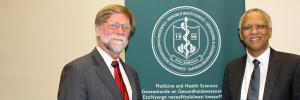
First Distinguished Leader talk explores global health through the ages
Is global health about the universal right to health, or is it about maintaining international security and containing the spread of diseases?
This very pertinent question was the focus of the first lecture in the new Distinguished Leader lecture series which kicked off at the Faculty of Medicine and Health Sciences in April 2017. Dr Nils Daulaire, Senior Fellow at the Harvard Global Institute and Distinguished Visiting Scholar at the Harvard TH Chan School of Public Health, gave the first lecture.
During the fascinating, hour-long talk, Daulaire explained how, over centuries, the world faced a constant push and pull of motivations in terms of whether the privileged, affluent members of society should care about the poor and their right to healthcare. Over time, these motivations shaped global health as we know it today.
Daulaire distinguished five eras of global health:
- Quarantine and exclusion
- Colonialism and imperialism
- Evangelism
- Ideological competition
- Globalisation
He went on to explain how the privileged influenced the health of the underprivileged over several centuries.
During the Middle Ages, quarantine and exclusion were used to control infectious diseases such as the Black Death. Those in power closed the gates of fortresses to lock the infected out, while primitive applications of biological warfare (e.g. throwing diseased bodies over fortress walls to keep enemies out) came into practice.
The era of colonialism and imperialism, on the other hand, saw native populations enslaved or eradicated to make room for settlers and farmers. Those who survived were impoverished and had limited access to healthcare. However, as the natives started playing an important role in the manufacturing of goods, their oppressors tried to keep them reasonably healthy in order to work.
During the third era of global health, evangelism and "winning souls" required a slightly different approach. A trend in missionary medicine grew through a mission to be of service to God. "This was closely linked to the idea of fundamental human rights," Daulaire said. "But it was a complex relationship."
Ideological competition followed during the era of the Cold War, when development became a central organising principle and the concept of international health first came into being.
The establishment of the United Nations and the adoption of the Universal Declaration of Human Rights created an international dialogue around the concept of universal human rights and a right to health. A focus on child and maternal health "played a role in the great war of winning hearts and minds," Daulaire said. And, in the 1970s, intense cooperation between the USA and the Soviet Union led to the eradication of smallpox.
During the fifth era, globalisation, the speed of communication and the rapid exchange of money and goods drove the international health agenda.
"The first time I heard the term 'global health' was in the mid-1990s," said Daulaire, who served as the President and CEO of the Global Health Council for longer than a decade. "It differed from 'international health' in that it emphasised the independent nature of health." It also created a different mind-set in terms of how health was approached across the world, with two themes emerging – the right to health and health as a fundamental aspect of security.
"The right to health drove remarkable successes in children's health and women's health," Daulaire continued. "It also shifted our attention to the HIV pandemic, malaria, TB and the neglected diseases of the poor." On the other hand, severe acute respiratory syndrome (SARS), avian flu and ebola demonstrated to the world's powerful that the neglect of health in the world's poorest countries could affect the world's wealthiest.
In a time of terrorism and relative ease in developing and deploying agents of biological terror, biological warfare also became a global concern once more. "This got the national security communities very highly engaged and interested," Daulaire said. "And it's now being recognised that you can't respond differently to intentional and natural outbreaks. In both instances, it's a question of identification, rapid response and counter measures."
But, thanks to globalisation, we now have a range of resources we never had before. We've also shifted to a place where we no longer build walls to keep threats out. Instead, countries now work together to minimise the risks. "It has become important to detect and respond to diseases before they spread nationally and internationally. This has reinforced the right to health, and has provided opportunities to work together collaboratively."
Returning to the question he asked at the start of his presentation (Is global health about the universal right to health or is it about international security?), Daulaire answered "yes". You simply can't address the one without the other.
These public lectures will serve as a forum for eminent leaders from across the spectrum of public, private and plural sectors, to share their personal vision and talk about their involvement in addressing some of society's most pressing issues.
Caption: Dr Nils Daulaire and Prof Jimmy Volmink, Dean: Faculty of Medicine and Health Sciences.
